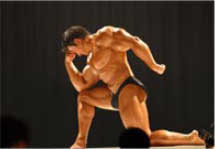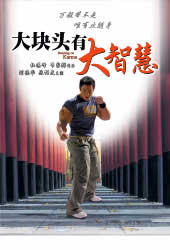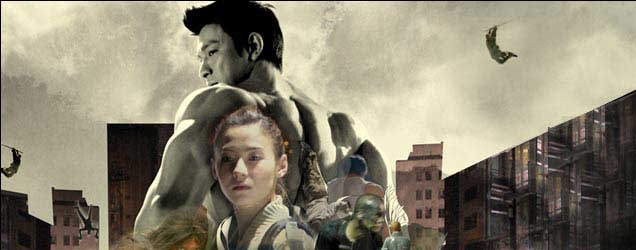Running On Karma (AKA Mr.
Big - Running On Karma)

Reviewed by YTSL
When people ask me why I love Hong Kong movies,
one of the reasons I give them is that “they’re much less “no holds barred”
and constrained by genre -- and, consequently, far less predictable -- than
Hollywood works.” Another is that many an offering from this largely
government subsidy-less cinema actually can seem like labors of love on the
part of their (primary) film-makers. Stories like Peter Chan having
paid Maggie Cheung’s salary so that she could appear in his “Comrades, Almost
a Love Story”, and Ann Hui’s “Song of the Exile” having been a semi-autobiographical
effort, only lend credence to this belief of mine. Then there’s the
senior helmer of this hard to categorize and classify -- because it starts
off as the sort of comedy many people had thought it would entirely be but
then also veers into action, (crime) drama, romantic and religious-philosophical
territories -- Milkyway Image production having stated earlier this year
that: “Apart from making a living, we want to make the kind of movies we
like. [After all, t]here are many other ways of making a living" (Johnnie
To, as quoted in the HKIFF's "Hong Kong Panorama, 2002-2003", 2003:84).

The Category IIB rated -- and more, I’d wager, for violence than anything
else -- RUNNING ON KARMA begins with a scene of an individual known as (Mr.)
Big (played by Andy Lau in the muscular equivalent of the rubber fat suit
he wore for nearly all of “Love on a Diet”) performing a strip-tease -- along
with other exhibitionistic inclined men -- in a night spot filled with screaming
women (The loudest of whom might well be Cecilia Cheung’s character, Lee
Fung Yee). A few scenes later, it’s all chaos in the club, however,
as it’s subject to a police raid that officially began with Big’s enthusiastically
obeying Lee Fung Yee’s cries to take it all off, only to have the bird-like
young female pull out a police badge and announce that she’s an undercover
officer upon his having done so.

In the meantime, and -- as it turns out -- not all that far way, another
group of police officers were carrying out a murder investigation at a generally
messy as well as bloody scene. Suddenly, a police dog starts barking
loudly at a particular rectangular shaped tin that might not otherwise have
attracted all that much attention from anyone. After its lid is opened,
the police find what looked, at first glance, to be a disembodied head of
an Indian man inside the container. When its eyes open and glare out
at the CID officers who had peered into the tin though, they realize that
the head actually belongs, and still is attached, to a tall and thin living
individual who somehow was able to fit all of himself into that very limited
space and -- upon being ordered by the police to do so -- easily plus improbably
emerge from out of it.

After getting handcuffed and chained, the Indian
man -- whose murder victim was another Indian man, one who he was revealed
to have known well -- was put into the back of a police car and seated in
between two CID men. Before they got very far into their journey back
to the police station, however, the suspect managed -- again, with disconcerting
ease -- to make his escape. Over the course of his getting pursued
through lit streets and darker alleyways, this individual -- who sometimes
looked to have been flying rather than running, and was later revealed to
be some kind of expert martial artist -- crosses path with the likes of Lee
Fung Yee and Big. Indeed, that duo might well have helped him escape;
what with Lee Fung Yee having accidentally shot and killed the police dog
who was giving chase, and Big having attracted the attention of some of the
CID officers (who proceeded to cuff and haul him into custody before sending
the illegal entrant into Hong Kong across the Mainland China-HKSAR border).

At this fairly early point in RUNNING ON KARMA, little had gotten revealed
as to what this Johnnie To and Wai Ka Fai co-directed film would daringly
develop into and where it would eventually go. Granted that the awe-inspiring
-- in both its ambition and execution -- movie’s two lead characters had
been introduced (to the audience and each other). However, they could
be said to not yet have been properly introduced since there’s quite a bit
of back story to both of them. Hopefully, it won’t be too much of a
spoiler to make known here that Big may now look to be a seemingly happy
go lucky plus very game entertainer but was formerly a Buddhist monk (and
one trained to be an expert martial arts exponent at that). Also, that
his reason for ceasing to be a holy man was not so much -- like he had told
Lee Fung Yee -- because being a monk didn’t bring in any money but due to
his having come by the often upsetting ability to see other beings’ karma,
future fates plus previous incarnations (after a series of incidents that
included the murder of his friend, Jade, by a man named Sun Ko and Big’s
accidentally killing an innocent sparrow in a fit of anger plus frustration
over the elusiveness of her murderer).
 For example, Big was able to discern that the Indian
murderer and murder victim had had connections to each other and also a Chinese
woman (who would lose her right arm) in this life but also, and albeit in
different forms (including a beetle), in a previous incarnation. More
saliently for a larger portion of RUNNING ON KARMA, he also could see Lee
Fung Yee’s having spiritual links with a Japanese soldier who had murdered
and decapitated many people in his life. What he chooses to do with
this knowledge -- and she upon this information getting shared with her --
is the prime determinant of the not easy-to-correctly predict path that Mr.
Big and Ms. Lee -- and also the often startling movie as a whole -- end up
taking. Suffice to say here that I found myself being very impressed
plus satisfied by the Yuen Bun action directed work’s turn of the events
-- and meaningful underlying message(s) -- on the two occasions (thus far)
that I have viewed this thoroughly thought-provoking offering.
For example, Big was able to discern that the Indian
murderer and murder victim had had connections to each other and also a Chinese
woman (who would lose her right arm) in this life but also, and albeit in
different forms (including a beetle), in a previous incarnation. More
saliently for a larger portion of RUNNING ON KARMA, he also could see Lee
Fung Yee’s having spiritual links with a Japanese soldier who had murdered
and decapitated many people in his life. What he chooses to do with
this knowledge -- and she upon this information getting shared with her --
is the prime determinant of the not easy-to-correctly predict path that Mr.
Big and Ms. Lee -- and also the often startling movie as a whole -- end up
taking. Suffice to say here that I found myself being very impressed
plus satisfied by the Yuen Bun action directed work’s turn of the events
-- and meaningful underlying message(s) -- on the two occasions (thus far)
that I have viewed this thoroughly thought-provoking offering.
My rating for the film: 9.








